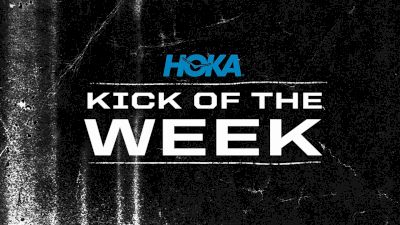Drug Suspicion Should not Be The Status Quo In Track And Field
Drug Suspicion Should not Be The Status Quo In Track And Field
Drug Suspicion Should not Be The Status Quo In Track And Field

Drug use has plagued track and field throughout modern times from the suspected doping of Soviet and East German teams during the Cold War era to the BALCO scandal of this century. This infamous history has lingered as a black cloud over the sport. Any track and field athlete today who suddenly runs fast, throws far or leaps a great distance is immediately questioned for drug use.
Following the final Diamond League meeting of 2011 in Brussels, Belgium, Philip Hersh of the Chicago Tribune wrote a story entitled “Did Yohan Blake just make it seem dopey to watch track?” in which he questions the legitimacy Jamaican sprinter’s 19.26 second 200 meter race – the second fastest time in history.
In his article Hersh uses statistics to gauge of Blake’s improvement. The 21 year-old improved his 200 meter best by 2.4 percent on Friday evening from his previous mark of 19.78 seconds set in 2010 but an even greater 6.4 percent improvement over the last two years.
But do these statistics really indicate drug use?
Perhaps strength work has been a greater emphasis in Blake’s training regimen. This makes sense as his 100 meter improvement curve has been much less dramatic than the progression of his 200 times. His personal best has only dropped from 9.93 seconds to 9.82 seconds from 2009 to 2011.
Perhaps Blake did not have the opportunity to run fast 200 meter races prior to 2010. Hersh is irresponsible for throwing out statistics like a 6.4 percent 200 meter improvement without pointing out the circumstances of the races. Blake’s personal best of 20.60 seconds in 2009 was run on February 21 of that year. Athletes are far from peak fitness that early on in the season when they focus on base training. The race run at the Jamaican national stadium in Kingston was so low-key that it did not even have a wind reading needed to certify the legality of record times. His sub-20 second times from 2010 and 2011 came during summer seasons when he raced against top competition on fast European tracks.
Numbers aside, the publication of drug suspicions is unnecessary. Some of us might question Blake’s performance in our minds and discuss it with training partners after a Sunday long run but airing these suspicions in a major newspaper is a reason why track and field is not popular in the United States.
Baseball fans have managed to get over the sport’s steroid era and appreciate the current performances for what they are. Part of this has been the effort of the entire community to move away from those years and establish a new era of clean players. You won’t see a baseball reporter accusing Toronto Blue Jays outfielder Jose Bautista of being juiced after hitting 54 home runs in 2010 when he previous best was only 16.
But track and field cannot get over its drug-filled past. Stories like Hersh’s reinforce the widespread paranoia over doping that hold the sport back from it can be. I may be naive but we should appreciate track and field, its athletes and their performances for what they are. When people are busted for drugs, they should be vilified, but until there is real proof, some things are better left unsaid.
Yohan Blake’s time progression – unfiltered (statistics from IAAF.org)
Event Season Time Wind Location Date
100 meters
2011 9.82 0.1 Berlin Sept 11, 2011
9.82 0.0 Zurich Sept 8, 2011
2010 9.89 -0.4 London Aug 13, 2010
2009 9.93 -0.2 Paris July 17, 2009
2008 10.27 0.5 Kingston Mar 14, 2008
2007 10.11 1.2 Providenciales Apr 7, 2007
2006 10.33 1.5 Port-of-Spain Jul 14, 2006
2005 10.56 0.9 Marrakech Jul 13, 2005
200 meters
2011 19.26 0.7 Brussels Sept 16, 2011
2010 19.78 0.1 Monaco Jul 22, 2010
2009 20.60 n/a Kingston Feb 21, 2009
2008 21.06 0.4 Kingston Jun 15, 2008
2007 20.62 1.0 Kingston Mar 31, 2007
2006 20.92 1.2 Kingston June 25, 2006
Read more from Kevin at Spikeduppsychedup.com and follow on Twitter @SpikedUpPsyched

Following the final Diamond League meeting of 2011 in Brussels, Belgium, Philip Hersh of the Chicago Tribune wrote a story entitled “Did Yohan Blake just make it seem dopey to watch track?” in which he questions the legitimacy Jamaican sprinter’s 19.26 second 200 meter race – the second fastest time in history.
In his article Hersh uses statistics to gauge of Blake’s improvement. The 21 year-old improved his 200 meter best by 2.4 percent on Friday evening from his previous mark of 19.78 seconds set in 2010 but an even greater 6.4 percent improvement over the last two years.
But do these statistics really indicate drug use?
Perhaps strength work has been a greater emphasis in Blake’s training regimen. This makes sense as his 100 meter improvement curve has been much less dramatic than the progression of his 200 times. His personal best has only dropped from 9.93 seconds to 9.82 seconds from 2009 to 2011.
Perhaps Blake did not have the opportunity to run fast 200 meter races prior to 2010. Hersh is irresponsible for throwing out statistics like a 6.4 percent 200 meter improvement without pointing out the circumstances of the races. Blake’s personal best of 20.60 seconds in 2009 was run on February 21 of that year. Athletes are far from peak fitness that early on in the season when they focus on base training. The race run at the Jamaican national stadium in Kingston was so low-key that it did not even have a wind reading needed to certify the legality of record times. His sub-20 second times from 2010 and 2011 came during summer seasons when he raced against top competition on fast European tracks.
Numbers aside, the publication of drug suspicions is unnecessary. Some of us might question Blake’s performance in our minds and discuss it with training partners after a Sunday long run but airing these suspicions in a major newspaper is a reason why track and field is not popular in the United States.
Baseball fans have managed to get over the sport’s steroid era and appreciate the current performances for what they are. Part of this has been the effort of the entire community to move away from those years and establish a new era of clean players. You won’t see a baseball reporter accusing Toronto Blue Jays outfielder Jose Bautista of being juiced after hitting 54 home runs in 2010 when he previous best was only 16.
But track and field cannot get over its drug-filled past. Stories like Hersh’s reinforce the widespread paranoia over doping that hold the sport back from it can be. I may be naive but we should appreciate track and field, its athletes and their performances for what they are. When people are busted for drugs, they should be vilified, but until there is real proof, some things are better left unsaid.
Yohan Blake’s time progression – unfiltered (statistics from IAAF.org)
Event Season Time Wind Location Date
100 meters
2011 9.82 0.1 Berlin Sept 11, 2011
9.82 0.0 Zurich Sept 8, 2011
2010 9.89 -0.4 London Aug 13, 2010
2009 9.93 -0.2 Paris July 17, 2009
2008 10.27 0.5 Kingston Mar 14, 2008
2007 10.11 1.2 Providenciales Apr 7, 2007
2006 10.33 1.5 Port-of-Spain Jul 14, 2006
2005 10.56 0.9 Marrakech Jul 13, 2005
200 meters
2011 19.26 0.7 Brussels Sept 16, 2011
2010 19.78 0.1 Monaco Jul 22, 2010
2009 20.60 n/a Kingston Feb 21, 2009
2008 21.06 0.4 Kingston Jun 15, 2008
2007 20.62 1.0 Kingston Mar 31, 2007
2006 20.92 1.2 Kingston June 25, 2006
Read more from Kevin at Spikeduppsychedup.com and follow on Twitter @SpikedUpPsyched

Related Content
 Grand Slam Track: What's All Happened In Their First Three Months?
Grand Slam Track: What's All Happened In Their First Three Months?Sep 19, 2024
 Sean Carlson Already Making Waves As Coach At Colorado
Sean Carlson Already Making Waves As Coach At ColoradoSep 19, 2024
 Olympic Bronze Medalist Melissa Jefferson Signs With Grand Slam Track
Olympic Bronze Medalist Melissa Jefferson Signs With Grand Slam TrackSep 19, 2024
 How to Watch: The Running Event 2024 | Track and Field
How to Watch: The Running Event 2024 | Track and FieldSep 18, 2024
 HOKA Kick of the Week: Down To The Wire Finish In Ohio
HOKA Kick of the Week: Down To The Wire Finish In OhioSep 18, 2024
 Diamond League Announces Prize Money Increase For 2025
Diamond League Announces Prize Money Increase For 2025Sep 18, 2024
 Ventura High School's Sadie Engelhardt Preps For Woodbridge XC Classic | Workout Wednesday
Ventura High School's Sadie Engelhardt Preps For Woodbridge XC Classic | Workout WednesdaySep 18, 2024
 Graham Blanks, OSU No. 1 In FloTrack College XC Rankings Presented by HOKA
Graham Blanks, OSU No. 1 In FloTrack College XC Rankings Presented by HOKASep 17, 2024
 Doris Lemngole, NAU Atop FloTrack College XC Rankings Presented by HOKA
Doris Lemngole, NAU Atop FloTrack College XC Rankings Presented by HOKASep 17, 2024